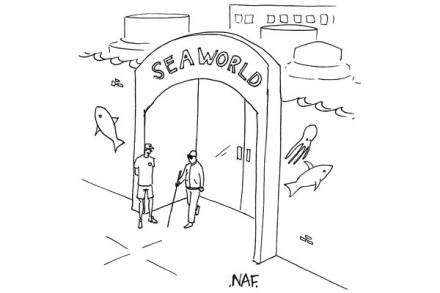Seaworld
‘I’m sorry you didn’t enjoy it, sir. We should be more specifi c that it’s not a sight-recovery experience.’

‘I’m sorry you didn’t enjoy it, sir. We should be more specifi c that it’s not a sight-recovery experience.’

Faith and flexibility Sir: What a contrast in your two articles on religion last week: one liberal atheist parent (Claire Stevens) concerned about her son’s turn to conservative Islam, and one conservative Catholic (Louise Mensch) determined that her children understand her unbending fidelity to the tradition. Ms Mensch’s problem is endemic throughout the western church,
How to deal with a troll In Scandinavian mythology, trolls were shady creatures who lived below ground and varied in size from giants (in Iceland) to dwarfs (in Sweden). They snatched infants and replaced them with baby trolls, or ‘changelings’, in an attempt to improve their breeding stock. They could, however, be tackled: — By

There is something depressing about the fact that it has taken a sick Spanish nurse to put Ebola back on the front pages. Since the summer, some 3,400 West Africans have died, but interest in the story here had waned. So long as the disease did not make the nine-mile leap across the Straits of

Home Alan Henning, 47, a British volunteer aid worker taken captive in Syria by Islamic State, was murdered, and footage of his death, which included an appearance by a man with an English accent nicknamed Jihadi John, was posted online. David Cameron, the Prime Minister, said: ‘We will do all we can to hunt down



In this week’s issue, Fraser Nelson and Nick Cohen examine how police are using the Regulation of Investigatory Powers Act (Ripa) to run wild in the public’s mobile phone records. Like many curtailments of British liberties, this started off in the name of fighting terrorism. It has now emerged that police forces used these anti-terror powers

From The Spectator, 10 October 1914: IT would be a base act to try to bribe or to threaten a neutral Power like Italy into joining the Allies. The notion of taking up the attitude that she may find herself in the wrong box when the peace is made is one which must be utterly

From ‘News of the Week’, The Spectator, 10 October 1914: The Germans must really be in very desperate straits if, as is alleged, they are straining every nerve to prepare a hundred Zeppelins and other aircraft to hover over London and bombard our capital from the clouds. No doubt the first appearance of the visitors
There is something depressing about the fact that it has taken a sick Spanish nurse to put Ebola back on the front pages. Since the summer, some 3,400 West Africans have died, but interest in the story here had waned. So long as the disease did not make the nine-mile leap across the Straits of

Nick Clegg delivered an aggressive speech this morning. But will it be enough to keep the Liberal Democrats in government? James Forsyth and Isabel Hardman discuss it in this View from 22 podcast special. James’s write-up is here, and Isabel’s is here. listen to ‘Podcast: Nick Clegg’s speech’ on audioBoom

listen to ‘Podcast: Nick Clegg’s speech’ on audioBoom Before I say anything else, I’m sure I speak on behalf of all Liberal Democrats when I say that our hearts and condolences go out to the family and friends of Alan Henning and David Haines for their tragic loss. These were good men. In the work

From The Spectator, 10 October 1914: American visitors have been surprised at the apparent absence of emotion in England at such a crisis as the present. They can see, they say, no signs that we realize the tremendous nature of the points at issue. The English people, they think, are not taking things seriously. Yet all the

From The Spectator, 10 October 1914: The Germans must really be in very desperate straits if, as is alleged, they are straining every nerve to prepare a hundred Zeppelins and other aircraft to hover over London and bombard our capital from the clouds. No doubt the first appearance of the visitors will have an alarming effect

From The Spectator, 10 October 1914: FRIDAY’S news from the western theatre of the war shows that we have already almost reached the condition of “chock-a-block” described in our leading article. The two opposing armies, the greater part of them strongly entrenched, face each other at close quarters in a line drawn from Switzerland to

From The Spectator, 3 October 1914: ALREADY we are engaged in the exacting task of creating an army during time of war ; and it is possible that to that task we may add the process of creating an industry. Mr. J. W. Robertson-Scott, who has written much on agricultural matters over the signature “Home

From The Spectator, 3 October 1914: The essential value of a fortress is to act as an anvil upon which the field army, or relieving army, outside, which is the hammer, may pound the assailants to atoms. If there is such an army out- side, the parts are reversed—the besiegers, since they must stick to

From The Spectator, 3 October 1914: We do not suggest that the voluntary principle should be abandoned during this war. The system is being worked for all it is worth ; it is answering well, thanks to the splendid spirit of the country ; and it would be absurd to change it mid-way for another

‘It’s a dog eat dog world, fortunately.’